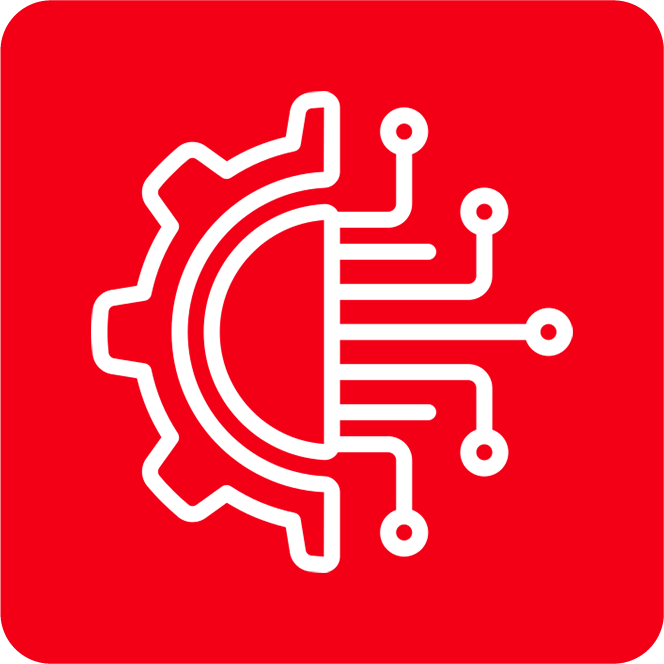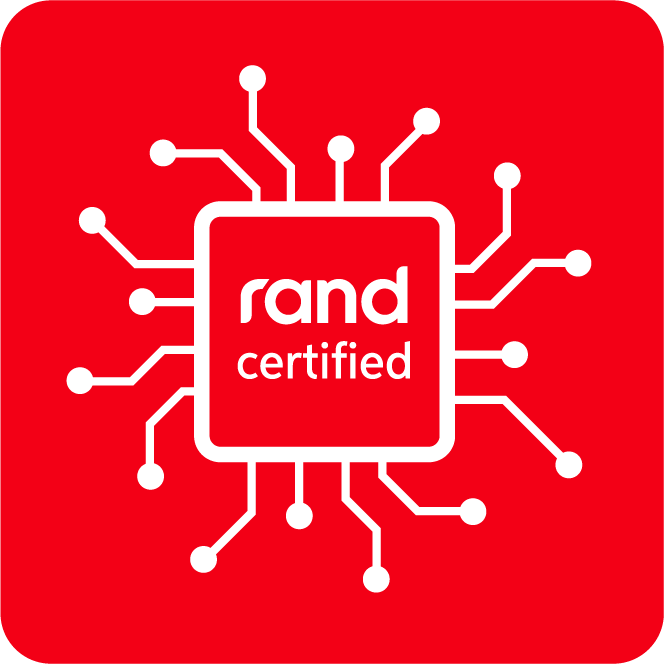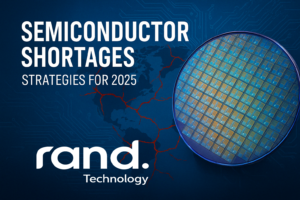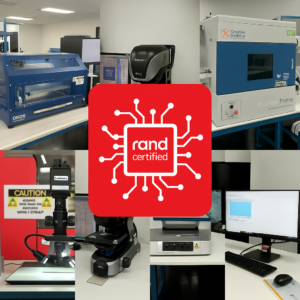The global electronics manufacturing landscape is undergoing a seismic shift driven by emerging technologies like artificial intelligence (AI), the Internet of Things (IoT), and electric vehicles (EVs). These trends are not only reshaping industries but also creating new opportunities and challenges for companies involved in the sourcing and distribution of electronic components. At Rand Technology, a leader in component sourcing, we have been at the forefront of this revolution, supplying critical components to various sectors, most notably the automotive industry.
As demand for advanced semiconductors and integrated circuits (ICs) grows, industries like automotive, aerospace, and consumer electronics are seeking more robust and efficient solutions. In this blog, we will explore the key trends in electronics manufacturing and discuss how Rand Technology is uniquely positioned to support these evolving needs.
1. The Rise of Artificial Intelligence in Electronics Manufacturing
Artificial intelligence (AI) is rapidly transforming industries, and its influence on electronics manufacturing is profound. AI enhances automation, predictive maintenance, and quality control processes in factories while simultaneously driving demand for specialized electronic components that power AI systems.
AI in Automotive Electronics
In the automotive sector, AI is fueling advancements in autonomous driving, vehicle-to-everything (V2X) communication, and advanced driver-assistance systems (ADAS). These applications require a new generation of high-performance microprocessors, sensors, and communication chips to process vast amounts of data in real time.
Rand Technology actively participates in the supply chain for AI-driven automotive innovations. For instance, our involvement in the Auto and Aerospace Show and the Auto Cluster in Chihuahua, Mexico, showcased our commitment to providing cutting-edge semiconductor solutions for the automotive sector. The shows highlighted how AI enables self-driving vehicles and predictive analytics in fleet management, which rely heavily on integrated circuits (ICs) and advanced sensors.
AI and Manufacturing Automation
Beyond the automotive industry, AI is being integrated into smart manufacturing systems to optimize production. This includes using AI for predictive maintenance, which helps manufacturers identify when machinery needs repairs before a failure occurs. AI also enables more precise and efficient quality control, reducing waste and improving overall product reliability.
As a trusted component supplier, Rand Technology has positioned itself as a key player in supporting the transition to AI-driven manufacturing processes. By sourcing specialized semiconductors and microcontrollers, we enable manufacturers to build smarter, more efficient production lines. Our expertise in sourcing components ensures that our partners can keep up with the rapid advancements in AI, allowing them to stay ahead of the curve in this competitive market.
2. The Internet of Things (IoT) and Its Impact on Electronics Manufacturing
The Internet of Things (IoT) is another transformative force in electronics manufacturing. It connects devices across industries and enables seamless communication between them. The growing number of IoT devices is driving the demand for electronic components, particularly low-power microcontrollers, connectivity solutions, and sensors.
IoT in Consumer Electronics
IoT devices such as smartphones, wearables, and home automation systems are becoming more prevalent in the consumer electronics sector. These devices rely on miniaturized semiconductors, connectivity modules, and energy-efficient sensors to communicate with each other and the cloud. The rapid growth of this market presents both opportunities and challenges for component suppliers.
Rand Technology has long been a supplier of key components for IoT devices, ensuring that our clients in the consumer electronics sector have access to reliable and energy-efficient semiconductors. We understand the importance of sourcing components that meet the rigorous demands of IoT applications, from low-power chips to advanced sensors that collect and transmit data in real time.
IoT in Industrial Applications
Beyond consumer devices, IoT is also making its mark in industrial sectors, where smart factories and connected machinery are revolutionizing manufacturing processes. IoT enables real-time monitoring and optimization of production lines in these environments, leading to increased efficiency and reduced downtime.
To support these innovations, Rand Technology offers a comprehensive range of industrial-grade electronic components that meet the stringent requirements of industrial IoT (IIoT) applications. Our extensive experience in sourcing components for harsh environments ensures that manufacturers can rely on us to provide durable, high-performance solutions for their IoT needs.
3. Electric Vehicles (EVs) and the Future of Automotive Electronics
The shift toward electric vehicles (EVs) is one of the most significant trends shaping the future of automotive electronics. EVs rely on a variety of electronic components, including power semiconductors, battery management systems (BMS), and inverter modules. As governments worldwide push for greener transportation, the demand for these components is surging.
Power Electronics in EVs
At the heart of every electric vehicle is a complex system of power electronics responsible for managing energy flow between the battery, motor, and other critical systems. This includes components like IGBTs (Insulated Gate Bipolar Transistors) and MOSFETs (Metal-Oxide-Semiconductor Field-Effect Transistors), which are essential for efficient power conversion.
Rand Technology continues to be a significant player in supplying the automotive industry. As EV manufacturers strive to improve efficiency and extend the range of their vehicles, they require high-quality, reliable components that can handle high voltages and currents. Our extensive network of global suppliers allows us to source the latest semiconductor technologies, ensuring that our automotive clients can stay ahead in the rapidly evolving EV market.
Battery Management and Charging Infrastructure
Another critical aspect of EVs is the battery management system (BMS), which ensures the safe and efficient operation of the vehicle’s battery pack. The BMS monitors parameters such as voltage, temperature, and charge levels, making EVs’ long-term reliability and safety essential. As the demand for EVs grows, so does the need for advanced BMS components, including sensors, microcontrollers, and power management ICs.
In addition to providing components for EVs themselves, Rand Technology is also actively involved in supporting the infrastructure needed for EV adoption, particularly charging stations. Charging stations require robust power electronics to handle the high currents needed for fast charging, and Rand Technology is well-positioned to supply these components.
4. Expanding Market Opportunities for Rand Technology
At Rand Technology, we have seen firsthand how these emerging technologies are reshaping the demand for electronic components. Our recent participation in the Auto and Aerospace show in Chihuahua, Mexico, demonstrated our commitment to serving the automotive industry, particularly in the EV and AI sectors. The show provided an opportunity to showcase our comprehensive range of semiconductors, power management ICs, and sensors to key players in the automotive and aerospace markets.
Diversifying into Aerospace and Defense
While the automotive sector remains a key focus for Rand Technology, we are also expanding our reach into the aerospace and defense sectors. These industries are increasingly adopting AI-driven systems, IoT-enabled communication, and advanced power electronics for applications ranging from satellites to military drones. Our expertise in sourcing high-reliability components positions us as a trusted partner for aerospace and defense manufacturers.
Supporting Sustainable Manufacturing
As industries worldwide move toward more sustainable practices, Rand Technology is committed to supporting this transition. By sourcing energy-efficient components and partnering with manufacturers focused on green technologies, we are helping to reduce the environmental impact of electronics manufacturing. This includes promoting the use of recyclable materials and supporting initiatives to reduce electronic waste.
Conclusion: Meet Rand Technology at Electronica 2024
Transformative technologies such as AI, IoT, and EVs are shaping the future of electronics manufacturing. These innovations are driving unprecedented demand for semiconductors, microcontrollers, and power electronics across multiple industries. At Rand Technology, we are committed to staying ahead of these trends by providing our clients with high-quality components and expert sourcing solutions.
As part of our ongoing commitment to innovation, Rand Technology will be showcasing at Electronica 2024 in Germany this November. We invite you to visit us and explore the latest advancements in semiconductors, ICs, and solutions for the automotive, aerospace, and other cutting-edge sectors. If you’d like to meet with our team and learn more about how we can support your business, please schedule a meeting with us in advance by clicking here.
Let’s connect and shape the future of electronics manufacturing together!


















